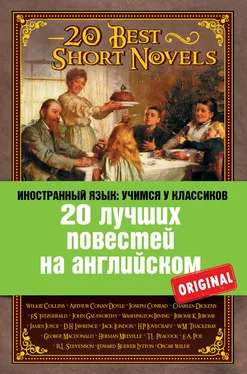These delays, however, could not continue for ever; and at a great family meeting held at Passover-time, Rebecca was solemnly ordered to choose a husband out of the gentlemen there present; her aunts pointing out the great kindness which had been shown to her by her father, in permitting her to choose for herself. One aunt was of the Solomon faction, another aunt took Simeon’s side, a third most venerable old lady the head of the family, and a hundred and forty-four years of age was ready to pronounce a curse upon her, and cast her out, unless she married before the month was over. All the jewelled heads of all the old ladies in council, all the beards of all the family, wagged against her: it must have been all awful sight to witness.
At last, then, Rebecca was forced to speak. ‘Kinsmen!’ she said, turning pale, ‘when the Prince Abou Abdil asked me in marriage, I told you I would not wed but with one of my own faith.’
‘She has turned Turk,’ screamed out the ladies. ‘She wants to be a princess, and has turned Turk,’ roared the rabbis.
‘Well, well,’ said Isaac, in rather an appeased tone, ‘let us hear what the poor girl has got to say. Do you want to marry his royal highness, Rebecca? Say the word, yes or no.’
Another groan burst from the rabbis–they cried, shrieked, chattered, gesticulated, furious to lose such a prize; as were the women, that she should reign over them a second Esther [806].
‘Silence,’ cried out Isaac, ‘let the girl speak. Speak boldly, Rebecca dear, there’s a good girl.’
Rebecca was as pale as a stone. She folded her arms on her breast, and felt the ring there. She looked round all the assembly, and then at Isaac. ‘Father,’ she said, in a thrilling low steady voice, ‘I am not of your religion – I am not of the Prince Boabdil’s religion – I – I am of his religion.’
‘His! whose, in the name of Moses, girl?’ cried Isaac.
Rebecca clasped her hands on her beating chest and looked round with dauntless eyes. ‘Of his,’ she said, ‘who saved my life and your honor: of my dear, dear champion’s. I never can be his, but I will be no other’s. Give my money to my kinsmen; it is that they long for. Take the dross, Simeon and Solomon, Jonah and Jochanan, and divide it among you, and leave me. I will never be yours, I tell you, never. Do you think, after knowing him and hearing him speak, – after watching him wounded on his pillow, and glorious in battle (her eyes melted and kindled again as she spoke these words), I can mate with such as you? Go. Leave me to myself. I am none of yours. I love him – I love him. Fate divides us long, long miles separate us; and I know we may never meet again. But I love and bless him always. Yes, always. My prayers are his; my faith is his. Yes, my faith is your faith, Wilfred–Wilfred! I have no kindred more, – I am a Christian!’
At this last word there was such a row in the assembly, as my feeble pen would in vain endeavor to depict. Old Isaac staggered back in a fit, and nobody took the least notice of him. Groans, curses, yells of men, shrieks of women, filled room with such a furious jabbering, as might have appalled the any heart less stout than Rebecca’s; but that brave woman was prepared for all; expecting, and perhaps hoping, that death would be her instant lot. There was but one creature who pitied her, and that was her cousin and father’s clerk, little Ben Davids, who was but thirteen, and had only just begun to carry a bag, and whose crying and boohooing, as she finished speaking, was drowned in the screams and maledictions of the elder Israelites. Ben Davids was madly in love with his cousin (as boys often are with ladies of twice their age), and he had presence of mind suddenly to knock over the large brazen lamp on the table, which illuminated the angry conclave; then, whispering to Rebecca to go up to her own room and lock herself in, or they would kill her else, he took her hand and led her out.
From that day she disappeared from among her people. The poor and the wretched missed her, and asked for her in vain. Had any violence been done to her, the poorer Jews would have risen and put all Isaac’s family to death; and besides, her old flame, Prince Boabdil, would have also been exceedingly wrathful. She was not killed then, but, so to speak, buried alive, and locked up in Isaac’s back-kitchen: an apartment into which scarcely any light, entered, and where she was fed upon scanty portions of the most mouldy bread and water. Little Ben Davids was the only person who visited her, and her sole consolation was to talk to him about Ivanhoe, and how good and how gentle he was; how brave and how true; and how he slew the tremendous knight of the Templars, and how he married a lady whom Rebecca scarcely thought worthy of him, but with whom she prayed he might be happy ; and of what color his eyes were, and what were the arms on his shield – viz. a tree with the word ‘Desdichado’ written underneath, &c. &c. &c.: all which talk would not have interested little Davids, had it come from anybody else’s mouth, but to which he never tired of listening as it fell from her sweet lips.
So, in fact, when old Isaac of York came to negotiate with Don Beltran de Cuchilla for the ransom of the Alfaqui’s daughter of Xixona, our dearest Rebecca was no more dead than you and I; and it was in his rage and fury against Ivanhoe that Isaac told that cavalier the falsehood which caused the knight so much pain and such a prodigious deal of bloodshed to the Moors: and who knows, trivial as it may seem, whether it was not that very circumstance which caused the destruction in Spain of the Moorish power?
Although Isaac, we may be sure, never told his daughter that Ivanhoe had cast up again, yet Master Ben Davids did, who heard it from his employer; and he saved Rebecca’s life by communicating the intelligence, for the poor thing would have infallibly perished but for this good news. She had now been in prison four years three months and twenty-four days, during which time she had partaken of nothing but bread and water (except such occasional tid-bits as Davids could bring her and these were few indeed; for old Isaac was always a curmudgeon, and seldom had more than a pair of eggs for his own and Davids’ dinner); and she was languishing away, when the news came suddenly to revive her. Then, though in the darkness you could not see her cheeks, they began to bloom again: then her heart began to beat and her blood to flow, and she kissed the ring on her neck a thousand times a day at least; and her constant question was, ‘Ben Davids! Ben Davids! when is he coming to besiege Valencia?’ She knew he would come: and, indeed, the Christians were encamped before the town ere a month was over.
And now, my dear boys and girls, I think I perceive behind that dark scene of the back-kitchen (which is just a simple flat, painted stone-color, that shifts in a minute,) bright streaks of light flashing out, as though they were preparing a most brilliant, gorgeous, and altogether dazzling illumination, with effects never before attempted on any stage. Yes, the fairy in the pretty pink tights and spangled muslin is getting into the brilliant revolving chariot of the realms of bliss. – Yes, most of the fiddlers and trumpeters have gone round from the orchestra to join in the grand triumphal procession, where the whole strength of the company is already assembled, arrayed in costumes of Moorish and Christian Chivalry, to celebrate the ‘Terrible Escalade,’ the ‘Rescue of Virtuous Innocence – the ‘Grand Entry of the Christians into Valencia’ – ‘Appearance of the Fairy Day-Star,’ and ‘Unexampled displays of pyrotechnic festivity.’ Do you not, I say, perceive that we are come to the end of our history; and, after a quantity of rapid and terrific fighting, brilliant change of scenery, and songs appropriate or otherwise, are bringing our hero and heroine together? Who wants a long scene at the last? Mammas are putting the girls’ cloaks and boas on; papas have gone out to look for the carriage, and left the box-door swinging open, and letting in the cold air: if there were any stage-conversation, you could not hear it, for the scuffling of the people who are leaving the pit. See, the orange-women are preparing to retire. To-morrow their play-bills will be as so much waste-paper – so will some of our masterpieces, woe is me: but lo! here we come to Scene the last, and Valencia is besieged and captured by the Christians.
Читать дальше
Конец ознакомительного отрывка
Купить книгу












